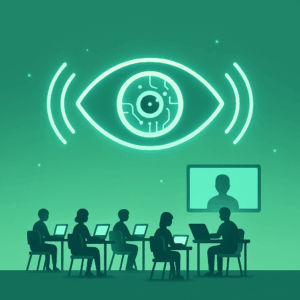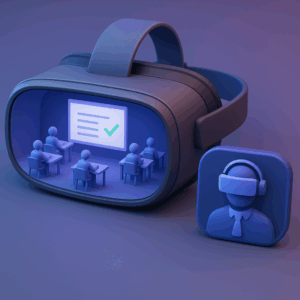In a world racing toward full automation, the question arises: Can we trust machines to proctor exams entirely on their own? As education and certification go digital, the integrity of remote exams is under constant threat. With students turning to AI chatbots for assistance and human proctors stretched thin, AI-powered remote proctoring is stepping up. But is it enough on its own? Let’s explore whether zero-human, fully automated proctoring is a dream come true—or a security risk waiting to happen.
The Rise of AI Proctoring: A Necessary Evolution
Online exams have exploded in popularity over the past few years. This shift brought convenience and accessibility, but also opened the door to cheating and misconduct. Traditional human proctoring, while effective, struggles with scalability, bias, and high costs.
This is where AI proctoring systems, like Proctortrack, come in. Using advanced machine learning, facial recognition, and behavior monitoring, Proctortrack can detect suspicious activity—such as unauthorized devices, unusual eye movements, or background voices—without a human watching live. It also logs and reports all these events in real time for post-exam review.
It is one thing to read about our amazing solution and another to experience it in action.
But automation isn’t just a convenience; it’s a response to growing threats. AI chatbots like ChatGPT or similar tools are increasingly used to cheat during exams. The human eye can’t always detect when someone is secretly getting answers fed to them. AI tools, on the other hand, can catch patterns and anomalies invisible to humans.
Proctortrack also integrates identity verification, session recording, and real-time data analytics into one seamless platform. It’s always on, always watching, and doesn’t get tired or distracted.
The Human Dilemma: Do We Still Need People in the Loop?
Despite all its strengths, there’s still hesitation around removing humans entirely from the proctoring equation. Why? Humans can make judgment calls that AI struggles with. For instance, if a student looks around nervously due to anxiety and not cheating, an AI might flag that as suspicious. A human might not.
AI also doesn’t understand context very well—at least, not yet. Proctortrack addresses this with a “review-first” model, where AI flags behavior and humans can later review it if needed. But the real innovation is in how the platform minimizes the need for review by becoming smarter and more accurate over time. It uses thousands of hours of training data to continually refine its algorithms, reducing false positives and improving reliability.
And let’s not forget the privacy angle. Students are often more comfortable knowing a machine is watching them than another person. It feels less intrusive, even if it’s equally effective. Proctortrack ensures compliance with strict privacy regulations like FERPA and GDPR, giving institutions and students peace of mind.
Yet, in extremely high-stakes exams—like those for medical or legal certification—a human proctor might still be added for layered security. That doesn’t mean the AI has failed; it means it’s smart enough to know when backup is needed.
Beating the Chatbot Cheaters: PEBble and the Secure Exam Future
One of the biggest threats to AI proctoring comes not from students but from other AIs. ChatGPT, Claude, and other bots can provide real-time answers during exams. A student can open a tab, ask a question, and get a perfect answer in seconds. This creates a dangerous game of cat-and-mouse between AI proctors and AI cheaters.
Enter PEBble, Proctortrack’s secure standalone browser, designed specifically to shut down this behavior. PEBble prevents students from opening new tabs, launching external apps, or accessing AI tools during an exam. It locks down the environment entirely, offering an uncompromising layer of defense against chatbot-assisted cheating.
PEBble is more than just a browser—it’s a digital exam vault. It monitors everything on the device and ensures only the test is in focus. It blocks shortcuts, disables screen sharing, and works hand-in-hand with Proctortrack’s core AI engine to ensure end-to-end exam security.
Unlike traditional lockdown browsers, PEBble is lightweight and intuitive. Students don’t need technical knowledge to use it, and it installs in seconds. That simplicity, combined with powerful back-end security, makes it a key player in the future of zero-human proctoring.
With PEBble in place, even if students are tempted to ask AI for help, they simply can’t. The digital door is locked, the AI guard is awake, and the test proceeds without compromise.
So… Can AI Proctoring Work Alone?
Yes—and no. Fully automated AI proctoring is powerful, scalable, and often more accurate than humans. Tools like Proctortrack and PEBble show us that machines can handle most of the heavy lifting: identity checks, behavior monitoring, environment lockdowns, and real-time flagging.
However, a touch of human oversight still matters, especially in edge cases. The best systems don’t completely remove humans; they minimize their role to rare, nuanced decisions. And that’s okay. The goal isn’t to replace humans—it’s to free them from repetitive tasks so they can focus on high-level review.
Platforms like Proctortrack don’t just rely on AI; they build a hybrid model where AI does the groundwork and humans handle exceptions. This leads to better outcomes, fewer mistakes, and a fairer experience for everyone involved.
A proactive security approach minimizes cheating risks while ensuring a seamless test experience at budget-friendly pricing.
Know our Pricing!
Summing up
We’re closer than ever to exams that need zero humans to ensure 100% security. AI proctoring, when done right, can detect cheating faster, at scale, and with greater consistency than any human team could. With Proctortrack’s smart automation and tools like PEBble guarding the digital front door, the future of online exams looks safe, secure, and scalable.
But like all technology, it works best when paired with human wisdom. Total security isn’t about eliminating people—it’s about empowering machines to do more, so people can step in only when truly needed.
Zero humans? Almost. Total security? Absolutely—if we do it right.











